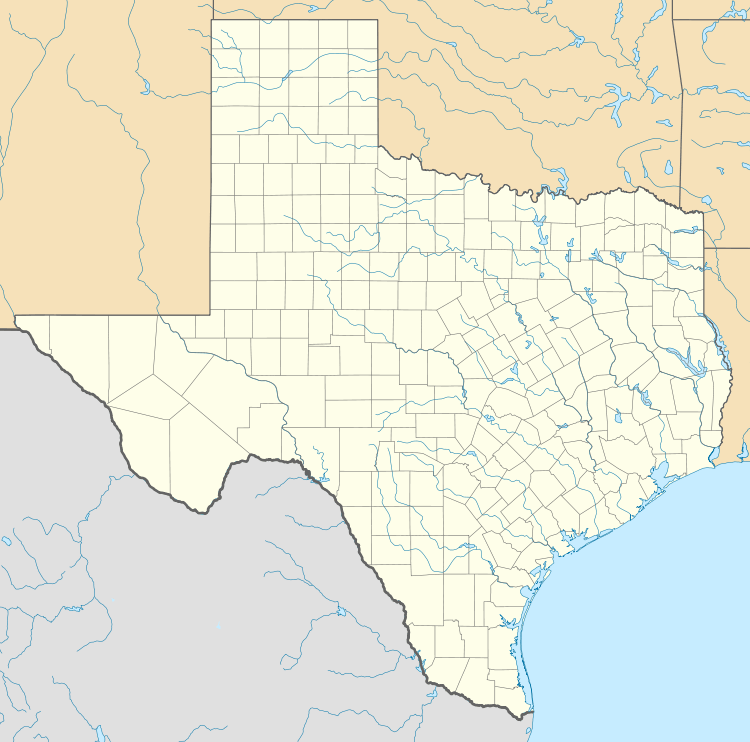Hot Springs (Big Bend National Park)
|
Hot Springs | |
|
Hot Springs cabins | |
  | |
| Location | W of Rio Grande Village, Big Bend National Park, Texas |
|---|---|
| Coordinates | 29°10′39″N 102°59′55″W / 29.17750°N 102.99861°WCoordinates: 29°10′39″N 102°59′55″W / 29.17750°N 102.99861°W |
| Area | 115 acres (47 ha) |
| Built | 1909 |
| NRHP Reference # | 74000278[1] |
| Added to NRHP | September 17, 1974 |
Hot Springs, also known as Boquillas Hot Springs, is a former resort in what is now Big Bend National Park in Texas. They were developed by J.O. Langford from 1909. Langford was a Mississippi native who had contracted malaria as a child. Searching for a cure, he heard of reputedly curative hot springs on the Rio Grande while visiting Alpine, Texas. Langford made a homestead claim, sight unseen. Although other homestead claims on the site had failed, Langford, his wife Bessie and his 18-month-old daughter set out for the site, discovering that it was already occupied by Cleofas Natividad with his wife and ten children. Initially considering the Natividads squatters, the Langfords developed a cooperative relationship with the Natividads. J.O. took a 21-day treatment of drinking and bathing in the spring waters, regaining his health.[2]
The site was the first major tourist attraction in the area, predating the establishment of the national park. Before the Langford's development, a small stone tub had been excavated in the local stone for bathing, with a dugout that was renovated by the Langfords as a residence. The Langfords later built an adobe house, a stone bathhouse, and brushwood bathing shelters. The Langfords left in 1912 when bandits made the area unsafe. When they returned in 1927 they rebuilt the bathhouse, but with a canvas roof. They also built a store and a motor court, consisting of seven attached cabins.[3]
The structures were built of local stone with wood trussed roofs covered with corrugated metal. Interior walls were plastered. Four of the motor court rooms featured painted murals. A terrace was covered with a long porch or ramada connecting the cabins.[3]
The historic district includes petrogylphs left by native American visitors. The springs were visited by Pedro de Rábago y Terán in 1747, who found Apaches farming the area. In later years the Comanche Trail passed nearby.[4] The hot springs remain, at a temperature of 105 degrees Fahrenheit, and may be used for soaking.[2] The spring is frequently submerged by the Rio Grande. The site is accessible by unpaved road, about 2 miles (3.2 km) west of Rio Grande Village, otherwise known as Boquillas.[5]
Hot Springs was placed on the National Register of Historic Places on September 17, 1974.[1]
References
- 1 2 National Park Service (2010-07-09). "National Register Information System". National Register of Historic Places. National Park Service.
- 1 2 "Hot Springs". National Park Service. Retrieved 31 October 2011.
- 1 2 Battle, David G. (February 1974). "National Register of Historic Places Inventory - Nomination Form: Hot Springs" (PDF). National Park Service. Retrieved 31 October 2011.
- ↑ Brune, Gunnar. "Boquillas Hot Springs". Handbook of Texas Online. Texas State Historical Association. Retrieved 31 October 2011.
- ↑ "Take a Soak in the Hot Springs". Retrieved 31 October 2011.
External links
- Hot Springs at Big Bend National Park
- Boquillas Hot Springs at the Handbook of Texas Online
- Planning your visit to the Hot Springs at Big Bend National Park


